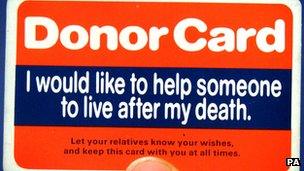'Clarity' call on organ donation
- Published

Full responses to the Welsh government's organ donation plans have now been published
The Law Society has called on the Welsh government for more clarity on the role of family members if a new organ donation law is to be introduced.
Currently, people wishing to donate their organs must carry donor cards or express their wishes to family.
Ministers want a soft opt-out system so everyone's organs are available for donation when they die unless they have said otherwise.
But the Law Society warns "the extent of the family's role is not certain".
Health minister Lesley Griffiths has said she could not imagine organs being removed if a family objected.
The response from the Law Society, which represents solicitors in Wales and England, was one of more than 1,000 submissions to the public consultation process which ended in January.
The Welsh government wants to introduce a 'soft opt-out' donation system, whereby people will have to object if they want to avoid being automatically placed on the organ donation register.
<link> <caption>Full details of the responses</caption> <altText>Full details of the responses</altText> <url href="http://new.wales.gov.uk/consultations/healthsocialcare/organ/?lang=en&status=closed" platform="highweb"/> </link> to the consultation were published on Wednesday, along with findings of qualitative research commissioned by the government.
On the issue of family involvement, the government's White Paper setting out its proposals states: "The Welsh government recognises the importance of the role of the family in a soft opt-out system.
"The wishes of the deceased will be respected and in order to safeguard these wishes family involvement is essential."
'Veto' confusion
But the Law Society claims that other comments in the proposals appear to confuse the issue of whether a family member may have a veto over organ donation.
The society said in its response: "The 'soft' element of the proposed system is the inclusion of a role for the family.
"However, the role of the family in the proposal seems to safeguard the wishes of the deceased alone.
"By referring to a role for the family without stating clearly that the family cannot refuse permission for the removal of organs and tissue, the paper is misleading."
The Law Society goes on to state that "the extent of of the family's role is not certain even in the minds of Welsh ministers and clarification is vital".
The health minister, Lesley Griffiths, went on the record in March on the issue of a potential family 'veto', as the initial responses to the consultation were published.
She said she "cannot envisage a time when a doctor would remove those organs if the family specifically didn't want that to happen".
The minister said she also hoped that the suggested donor system would mean that relatives were aware of a patient's wishes, and whether they had decided to register as not being a donor.
Roy Thomas, the chairman of Kidney Wales Foundation, which has vocally backed the opt-out presumed consent plans, said he believed families should be able to have the last say on organ donation.
"We believe they should - it is as simple as that," he told BBC Wales.
"It's a difficult time and we shouldn't have doctors removing organs without the consultation of the family."
However, the confusion over a family's role is also highlighted in <link> <caption>research commissioned by the Welsh government</caption> <altText>research commissioned by the Welsh government</altText> <url href="http://wales.gov.uk/docs/caecd/research/120418organdonationen.pdf" platform="highweb"/> </link> as part of the consultation process.
The authors of the qualitative study, carried out by Beaufort Research, stated in their conclusions: "The most pressing concern from participants' perspective was the lack of clarity over the influence of (and role played by) family members at the point of organ donation, and the realisation that family members could effectively 'overturn' the wishes of the deceased.
"The need for family involvement was not widely understood."
- Published18 April 2012
- Published8 March 2012
- Published8 March 2012
- Published2 March 2012